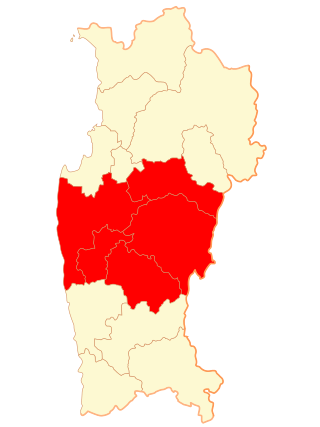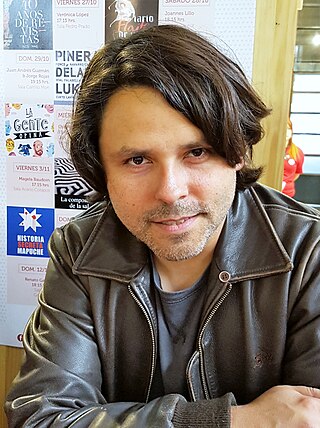| |||||
| Decades: | |||||
|---|---|---|---|---|---|
| See also: | |||||
This article needs additional citations for verification .(February 2024) |
The following lists events that happened during 1994 in Chile .
| |||||
| Decades: | |||||
|---|---|---|---|---|---|
| See also: | |||||
This article needs additional citations for verification .(February 2024) |
The following lists events that happened during 1994 in Chile .

The Socialist Party of Chile is a centre-left political party founded in 1933. Its historic leader was President of Chile Salvador Allende, who was deposed in a coup d'état by General Augusto Pinochet in 1973. The military junta immediately banned socialist, Marxist and other leftist political parties. Members of the Socialist party and other leftists were subject to violent suppression, including torture and murder, under the Pinochet dictatorship, and many went into exile. Twenty-seven years after the 1973 coup, Ricardo Lagos Escobar won the Presidency as the Socialist Party candidate in the 1999–2000 Chilean presidential election. Socialist Michelle Bachelet won the 2005–06 Chilean presidential election. She was the first female president of Chile and was succeeded by Sebastián Piñera in 2010. In the 2013 Chilean general election, she was again elected president, leaving office in 2018.

The Radical Party of Chile, is a classical radical political party in Chile. The party has also been referred to as liberal, social-liberal, and social-democratic.
This article gives an overview of liberal and radical parties in Chile. It is limited to liberal and radical parties with substantial support, mainly proved by having had a representation in parliament. The sign ⇒ means a reference to another party in that scheme. For inclusion in this scheme, parties do not necessarily need to have labeled themselves as a liberal party.

The Citizen Left Party of Chile, known until 2013 as Christian Left Party of Chile was a Chilean left-wing political party. Founded in 1971, in its early days it was suppressed by the Pinochet dictatorship. It was part of the Nueva Mayoría coalition, supporting the presidential candidacy president Michelle Bachelet in 2013.

Vicuña is a Chilean commune and city in Elqui Province, Coquimbo Region, founded during the government of Bernardo O'Higgins to secure sovereignty over the Elqui Valley. Poet Gabriela Mistral was born there in 1889. It shares borders to the west with the communes of La Higuera, La Serena and Andacollo, to the east with Argentina and to the south with Paihuano and Rio Hurtado. The commune is administered by the municipality of Vicuña, which is the principal city of the Valle de Elqui.

Coquimbo is a port city, commune and capital of the Elqui Province, located on the Pan-American Highway, in the Coquimbo Region of Chile. Coquimbo is situated in a valley 10 km (6 mi) south of La Serena, with which it forms Greater La Serena with more than 400,000 inhabitants. The commune spans an area around the harbor of 1,429.3 km2 (552 sq mi). The average temperature in the city lies around 14 °C (57 °F), and precipitation is low.

The Elqui River starts in the west Andes and flows into the Pacific Ocean near the Chilean city of La Serena. It is a wine and pisco producing area. Vicuña, the main town of the middle valley, was the home of Nobel Laureate poet Gabriela Mistral.

The Radical Democracy, was a Chilean centre-right political party. The party, created in 1969, was dissolved in 1973, and reappeared in 1983 before disbanding permanently in 1990.

The Popular Unitary Action Movement or MAPU was a small leftist political party in Chile. It was part of the Popular Unity coalition during the government of Salvador Allende. MAPU was repressed during the dictatorship of Augusto Pinochet. In this period, some of its most radical members formed the Movimiento Juvenil Lautaro, whose leaders were political prisoners during the dictatorship and with the return to democracy. Another faction of the former members of the party joined the social democratic Party for Democracy in 1987.

The Radical Party was a Chilean political party. It was formed in 1863 in Copiapó by a split in the Liberal Party. Not coincidentally, it was formed shortly after the organization of the Grand Lodge of Chile, and has maintained a close relationship with Chilean Freemasonry throughout its life. As such, it represented the anticlericalist position in Chilean politics, and was instrumental in producing the "theological reforms" in Chilean law in the early 1880s. These laws removed the cemeteries from the control of the Roman Catholic Church, established a civil registry of births and death in place of the previous recordkeeping of the church, and established a civil law of matrimony, which removed the determination of validity of marriages from the church. Prior to these laws, it was impossible for non-Catholics to contract marriage in Chile, and meant that any children they produced were illegitimate. Non-Catholics had also been barred from burial in Catholic cemeteries, which were virtually the only cemeteries in the country; instead, non-Catholics were buried in the beaches, and even on the Santa Lucia Hill in Santiago, which, in the 19th century, functioned as Santiago's dump.

The Parliamentary Era in Chile began in 1891, at the end of the Civil War, and spanned until 1925 and the establishment of the 1925 Constitution. Also called "pseudo-parliamentary" period or "Parliamentary Republic", this period was thus named because it established a quasi-parliamentary system based on the interpretation of the 1833 Constitution following the defeat of President José Manuel Balmaceda during the Civil War. As opposed to a "true parliamentary" system, the executive was not subject to the legislative power but checks and balances of executive over the legislature were weakened. The President remained the head of state but its powers and control of the government were reduced. The Parliamentary Republic lasted until the 1925 Constitution drafted by President Arturo Alessandri and his minister José Maza. The new Constitution created a presidential system, which lasted, with several modifications, until the 1973 coup d'état.

Limarí Province is one of three provinces of the Chilean region of Coquimbo Region (IV). Its capital is the city of Ovalle
Nicaraguan literature can be traced to pre-Columbian times with the myths and oral literature that formed the cosmogonic view of the world that indigenous people had. They told him that of these stories are still known in Nicaragua. Like many Latin American countries, the Spanish conquerors have had the most effect on both the culture and the literature. The literature of Nicaragua has had many important literary figures in the Spanish language with internationally prominent writers such as Rubén Darío, who is regarded as the most important literary figure in Nicaragua. He is referred to as the "Father of Modernism" for leading the modernismo literary movement at the end of the 19th century. Other important literary figures include Salomón de la Selva, Carlos Martínez Rivas, Pablo Antonio Cuadra, Alberto Cuadra Mejia, Manolo Cuadra Vega, Pablo Alberto Cuadra Arguello, Ernesto Cardenal, Sergio Ramírez Mercado, Gioconda Belli, José Coronel Urtecho, Alfonso Cortés, Julio Valle Castillo, and Claribel Alegría, among others.

Julio Alberto Mercado Illanes (1920–1994) was a Chilean accountant, businessman and politician. He was born in Vicuña, in the Elqui Valley area on January 14, 1920, and died in Santiago on April 23, 1994. His remains are interred in Vicuña. He was the son of Juvenal Mercado and Zunilda Illanes Olivares.
Illanes is a Spanish-origin surname, appearing in the names of:
The following lists events that happened during 1920 in Chile.

Alberto Baltra Cortés was a Chilean politician and economist, a member of the Radical Party.

Alberto Manfredo Mayol Miranda is a Chilean sociologist, political analyst, and politician. An independent researcher, and author of several works on social sciences, politics, and culture, he was a candidate in the Broad Front 2017 presidential primary.

Alberto Illanes Puente is a Bolivian football manager and former player who played as a defender. He is the current manager of Nacional Potosí.